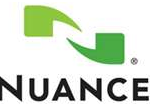 In this press release, Nuance announced that it is acquiring MacSpeech, a company that has been developing speech recognition resources for Apple’s MacIntosh computers since 1996. Because MacSpeech started licensing Dragon Dictate in 2008, this acquisition may amount to a mere formality. But Peter Mahoney, Dragon’s general manager (as well as senior vice president of Nuance) explains that the two companies will work more closely to bring a line of Dragon branded dictation software to market that is “100 percent Mac.”
In this press release, Nuance announced that it is acquiring MacSpeech, a company that has been developing speech recognition resources for Apple’s MacIntosh computers since 1996. Because MacSpeech started licensing Dragon Dictate in 2008, this acquisition may amount to a mere formality. But Peter Mahoney, Dragon’s general manager (as well as senior vice president of Nuance) explains that the two companies will work more closely to bring a line of Dragon branded dictation software to market that is “100 percent Mac.”
Symbolically, the move signals that Nuance (especially with the Dragon brand) is emerging as the most-favored speech-processing technology across Apple’s broad spectrum of computing and communications platforms, including personal computers, notebooks, laptops, iPhones, iPods and (we would supposed) the upcoming iPad. As we’ve all learned from the “Google phenomenon”, the more utterances that a company is able to collect on behalf of a broad customer base, the better the odds of accurate rendering of spoken words. Stated differently, deeper integration into Apple’s application environment should translate into a better user experience as those users help computers “learn” to understand what they are saying.
Google’s “cloud-based” approach to speech recognition makes it “platform agnostic”, therefore we will continue to see speech-enabled Google applications on iPhones and other connected platforms. Google will continue to use the voluminous amounts of spoken phrases to expand a portfolio of offerings that already includes search, transcription and translation. Nuance’s is responding by forging relationships aimed to make its speech-enabled applications work well on Mac’s and other Apple branded products, while at the same time supporting multimodal communications on a wide variety of mobile handsets.
Now, all eyes (or ears) should be on Microsoft, the only other “superpower” with the ability to define and refine speech-enabled user experience across platforms and modalities. With its own speech recognition “engine”, a dedicated speech app server farm called Tellme and some excellent “voice search” apps operating under the Bing brand, it has the potential to compete. But, as Greg Sterling noted in this post about the introduction of its new mobile operating system, it has definitely bestowed second-class status to its voice enabled services.
Categories: Articles

 Instruction-Following Gets an Upgrade: What GPT-4.1 Means for the Future of Conversational AI
Instruction-Following Gets an Upgrade: What GPT-4.1 Means for the Future of Conversational AI  Why Voice AI Is Foundational for Enterprise Innovation (Webinar)
Why Voice AI Is Foundational for Enterprise Innovation (Webinar)  Zendesk Relate: Getting the Job Done with a Resolution Platform
Zendesk Relate: Getting the Job Done with a Resolution Platform  Experience Reimagined: Medallia’s Leap into Unstructured Data
Experience Reimagined: Medallia’s Leap into Unstructured Data